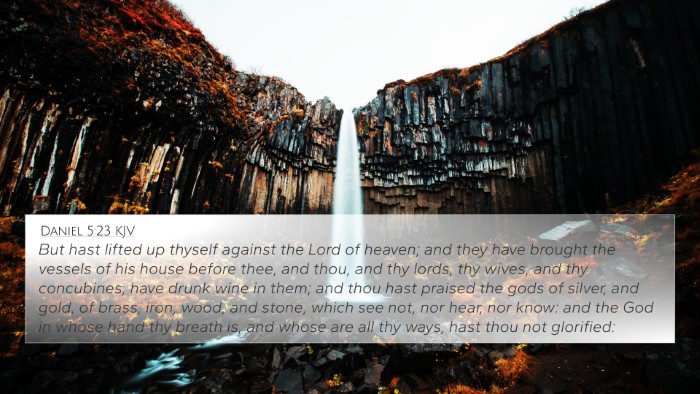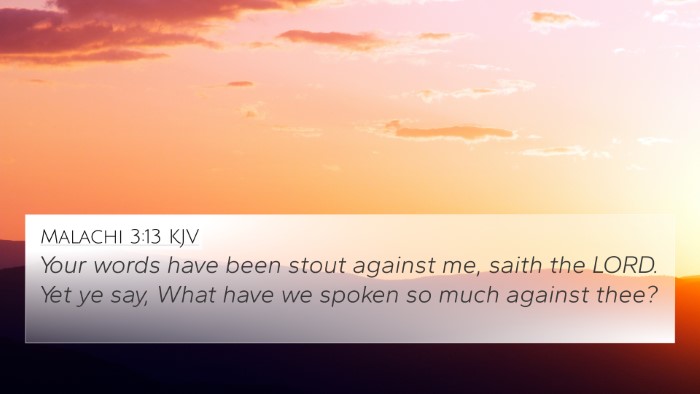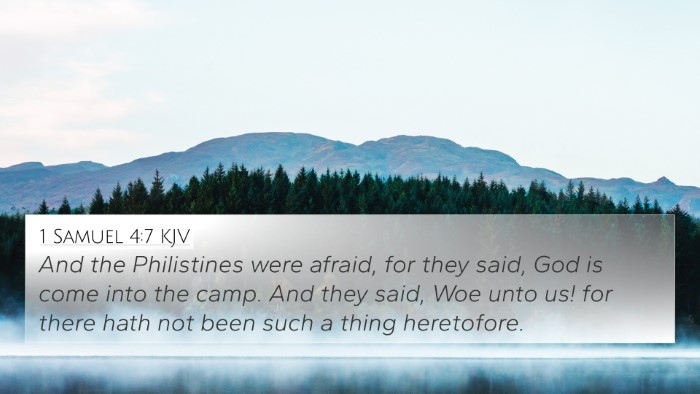This section features a detailed cross-reference designed to enrich your understanding of the Scriptures.
Below, you will find carefully selected verses that echo the themes and teachings related to Job 15:25 KJV. Click on any image to explore detailed analyses of related Bible verses and uncover deeper theological insights.
 Daniel 5:23 (KJV) »
Daniel 5:23 (KJV) »
But hast lifted up thyself against the Lord of heaven; and they have brought the vessels of his house before thee, and thou, and thy lords, thy wives, and thy concubines, have drunk wine in them; and thou hast praised the gods of silver, and gold, of brass, iron, wood, and stone, which see not, nor hear, nor know: and the God in whose hand thy breath is, and whose are all thy ways, hast thou not glorified:
 Psalms 73:9 (KJV) »
Psalms 73:9 (KJV) »
They set their mouth against the heavens, and their tongue walketh through the earth.
 Malachi 3:13 (KJV) »
Malachi 3:13 (KJV) »
Your words have been stout against me, saith the LORD. Yet ye say, What have we spoken so much against thee?
 1 Samuel 6:6 (KJV) »
1 Samuel 6:6 (KJV) »
Wherefore then do ye harden your hearts, as the Egyptians and Pharaoh hardened their hearts? when he had wrought wonderfully among them, did they not let the people go, and they departed?
 Job 36:9 (KJV) »
Job 36:9 (KJV) »
Then he sheweth them their work, and their transgressions that they have exceeded.
 Psalms 52:7 (KJV) »
Psalms 52:7 (KJV) »
Lo, this is the man that made not God his strength; but trusted in the abundance of his riches, and strengthened himself in his wickedness.
 Job 9:4 (KJV) »
Job 9:4 (KJV) »
He is wise in heart, and mighty in strength: who hath hardened himself against him, and hath prospered?
 Isaiah 10:12 (KJV) »
Isaiah 10:12 (KJV) »
Wherefore it shall come to pass, that when the Lord hath performed his whole work upon mount Zion and on Jerusalem, I will punish the fruit of the stout heart of the king of Assyria, and the glory of his high looks.
 Exodus 5:2 (KJV) »
Exodus 5:2 (KJV) »
And Pharaoh said, Who is the LORD, that I should obey his voice to let Israel go? I know not the LORD, neither will I let Israel go.
 Acts 12:23 (KJV) »
Acts 12:23 (KJV) »
And immediately the angel of the Lord smote him, because he gave not God the glory: and he was eaten of worms, and gave up the ghost.
 Acts 12:1 (KJV) »
Acts 12:1 (KJV) »
Now about that time Herod the king stretched forth his hands to vex certain of the church.
 Isaiah 41:4 (KJV) »
Isaiah 41:4 (KJV) »
Who hath wrought and done it, calling the generations from the beginning? I the LORD, the first, and with the last; I am he.
 Isaiah 27:4 (KJV) »
Isaiah 27:4 (KJV) »
Fury is not in me: who would set the briers and thorns against me in battle? I would go through them, I would burn them together.
 Isaiah 8:9 (KJV) »
Isaiah 8:9 (KJV) »
Associate yourselves, O ye people, and ye shall be broken in pieces; and give ear, all ye of far countries: gird yourselves, and ye shall be broken in pieces; gird yourselves, and ye shall be broken in pieces.
 Job 40:9 (KJV) »
Job 40:9 (KJV) »
Hast thou an arm like God? or canst thou thunder with a voice like him?
 1 Samuel 4:7 (KJV) »
1 Samuel 4:7 (KJV) »
And the Philistines were afraid, for they said, God is come into the camp. And they said, Woe unto us! for there hath not been such a thing heretofore.
 Exodus 9:17 (KJV) »
Exodus 9:17 (KJV) »
As yet exaltest thou thyself against my people, that thou wilt not let them go?
 Acts 9:5 (KJV) »
Acts 9:5 (KJV) »
And he said, Who art thou, Lord? And the Lord said, I am Jesus whom thou persecutest: it is hard for thee to kick against the pricks.






















